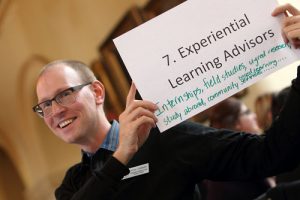
Consultation Fair puts academic advising under the microscope
By Neale McDevitt
The term “academic advising” is a pretty sweeping one that encompasses a wide variety of complex, multi-faceted issues. For proof of that complexity, one need look no farther than Tuesday’s Consultation Fair that brought together students, staff, faculty members and administrators from across the University for a two-and-a-half hour roundtable discussion on academic advising and graduate supervision.
Actually, it was as series of simultaneous roundtables – some 20 in all – with each table serving as the hub around which a different advising-related topic was discussed. The focus ranged from first-year advising to online resources to peer advising to career services for graduate students.
Despite the diversity in topics, at the end of the session one common thread seemed to run through the entire event – the need for better communication.
“The advising landscape at McGill is fairly complex and it’s hard to find your way around,” said Andre Costopoulos, Associate Dean (Student Affairs), Faculty of Arts. He noted that with advising available at Service Point, at the faculty level and at the program level, first-year students are often unsure of where to turn. “Many students have told me that it’s very difficult to navigate and that they only know their way around now [that they’re ready to graduate].
“Someone suggested that we have a website where graduating students can write about their advising experiences… in order to transfer some of that knowledge accumulated from graduating students back to incoming students,” Costopoulos said.
This transferring of knowledge and the tabling of possible solutions to problems was at the core of the Fair, where each table was moderated by a student and a faculty or staff member. The Fair attracted participants from across McGill, including Principal Heather Munroe-Blum and Provost Anthony C. Masi.
Many tables seemed to adopt a similar operating procedure by letting the students lead the discussions. They were asked what their expectations were for each topic and how well those expectations have been met. A large portion of the discussions was dedicated to areas that needed to be improved and the laying out of possible solutions to existing problems.
Mandatory advising?
At the table for the roles and expectations of undergraduate advising, a number of third- and fourth-year undergrads said they weren’t satisfied with the scope of the advising they had received to date.
One English student recounted how, now that he is at the end of his undergraduate degree, he has realized he may have been more suited to studying at the School of the Environment. He suggested that a more attentive advisor might have flagged his solid science marks on his high school transcript and suggested other options when it was time to chose a major.
“The problem is that we never even reached that discussion,” he said. “The advisor looked at my transcript and said ‘Your marks are good. Everything is fine here.’ But if the kid comes to McGill with high calculus grades and is going into Arts, maybe someone should let him know that there are there other doors open door for him.”
Sitting at the same table, a Philosophy major suggested that this problem might be addressed by making it mandatory for all undergrads see an advisor at least once a year and to have that the same advisor follows the student throughout their academic career. “That way, you can build a real relationship and your advisor would be able to offer real guidance in terms of where you want to go in your academic career and what you see yourself doing beyond University.”
Getting the word out
At the end of the Fair, a representative from each table was given a microphone and one minute to summarize the central topics of discussion at their table, including possible solutions.
The need to improve the lines of communication was the overriding theme. People offered numerous suggestions for ways to better keep students abreast of important information. These suggestions included using Skype, online chat and webinars as ways to connect with international students prior to their arrival at McGill; creating a slideshow on the student homepage that would remind students of critical advising milestones and dates coming up in the academic calendar; and enlisting the help of floor fellows in residences to help identify students in difficulty.
In her closing remarks, Linda Jacobs Starkey, Interim Dean of Students, told the room that the notes taken at each table would be consolidated and posted on the Consultation Fair’s website. The suggestions will be further deliberated by various advisory groups, she said, and the best will be put into action over the coming months.
Congratulating participants for being “so creative and productive,” Starkey also imploring them to continue thinking about ways to improve advising at McGill at all levels. “It doesn’t mean the deliberations on advising have to end here today,” she said. “It does mean you can go back to the website and continue to give us information and ideas.”
